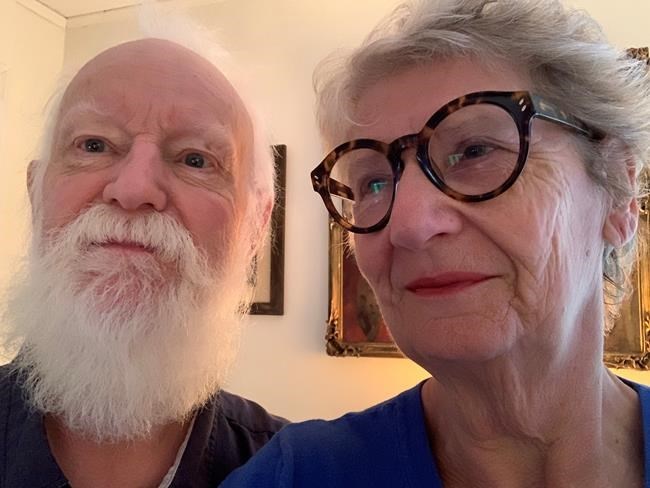
Christiane and Murry Coopman are shown in a handout photo. Christiane Coopman, a 73-year-old blood cancer patient in Chilliwack, B.C., and her husband Murry who suffers from melanoma, both received booster doses of the COVID-19 vaccine two weeks ago. But their vulnerable health conditions still leave them wary of Thanksgiving get-togethers.
THE CANADIAN PRESS/HO-Cristiane Coopman **MANDATORY CREDIT**
Republished October 07, 2021 - 1:37 PM
Original Publication Date October 07, 2021 - 10:31 AM
Christiane Coopman's Thanksgiving plans don't include an elaborate stuffed turkey dinner or the excited chatter of her grandchildren around the dining table.
Just like last year, Coopman's Thanksgiving will be a subdued affair, with turkey sandwiches shared with her husband and a video call from the kids.
Coopman, a 73-year-old blood cancer patient in Chilliwack, B.C., and her husband who suffers from melanoma, both received booster doses of the COVID-19 vaccine two weeks ago. But their vulnerable health conditions still leave them wary of holiday get-togethers.
"For blood cancer patients, we don't generate (much) protection after two doses, and now that I have a third dose, it's possible I have 90 per cent protection, but it's possible I have six per cent," said Coopman, who was diagnosed with chronic lymphocytic leukemia eight years ago.
"If I get COVID, it would take one week and I'd be dead. Why would I risk that?"
Coopman is one of many immunocompromised Canadians deciding to forego or modify their traditional Thanksgiving plans this weekend. Despite high vaccination rates across the country, the COVID-19 virus continues to circulate, causing anxiety among those most susceptible to it.
Dr. Deepali Kumar, a transplant infectious disease physician at University Health Network, said reluctance around hosting or attending holiday events is commonplace among her immunocompromised patients.
Kumar co-authored a study on booster doses in organ transplant recipients earlier this year, finding that while a third jab offers some patients more protection against COVID-19, it doesn't work for all of them — and most will never know how shielded they are.
"I listen to this frustration every day, and all I can say is that we (researchers) are working on different ways of ensuring that anybody who's immunocompromised is protected," she said. "It's possible we may never have the same level of protection in the immunocompromised that we do in the general population.
"The best way to make sure they're protected is to get everybody vaccinated (to) reduce transmission of COVID in the community as much as we can."
While Kumar noted it can be disappointing for immunocompromised individuals to feel held back as others move on to a more normal life, she said it's possible to have safe Thanksgiving gatherings with some stipulations.
She suggested keeping the groups small and limited to only fully vaccinated guests. While kids under 12 are not yet eligible for vaccination, she said they can attend safely if parents stay vigilant about any COVID-19 cases in their schools leading up to the event.
Kumar said COVID-19 levels within the local community also matter. Immunocompromised people living in areas with few daily cases can take more liberties than those in provinces such as Alberta and Saskatchewan, which are mired in fourth waves.
Alberta's chief medical officer Dr. Deena Hinshaw warned this week that indoor gatherings, including Thanksgiving dinners, are "still not permitted" for unvaccinated individuals. She urged even vaccinated families to celebrate outdoors instead.
New Brunswick, meanwhile, told its residents to stick to single-household gatherings, part of new restrictive measures aimed at halting the recent rise of cases in that province.
Ontario's top doctor Kieran Moore said this week that while people attending fully vaccinated Thanksgiving dinners could remove their masks indoors if they were comfortable, he still recommended keeping groups with unvaccinated guests outdoors with face coverings on.
He suggested masks be worn at gatherings that involve people "vulnerable to this virus," such as older guests and those with chronic medical conditions.
Tina Proulx, a double-lung transplant recipient in Ottawa is taking a "baby step" this Thanksgiving, venturing out to her sister's house for dinner along with six of her relatives.
The holiday feast marks the first time since before the pandemic that Proulx will gather indoors with more than two family members at once, and the first time those relatives, who are fully vaccinated, haven't been asked to quarantine for 14 days before her visit as an added precaution.
Proulx and her husband will eat and a separate table, at a comfortable distance but close enough to still feel part of the celebration, she said. Attendees will be masked when not eating, and Proulx's brother, who has unvaccinated children, won't be at the gathering.
The 38-year-old knows it sounds like a lot of precautions for a small family get-together, especially considering the risk of catching the virus from a fully vaccinated person is low. But her relatives understand the extra vigilance.
"They've seen everything I've gone through," said Proulx, who was diagnosed with pulmonary hypertension a decade ago and received a new set of lungs in 2015.
"They certainly don't want to put me at risk."
Proulx received her third COVID-19 vaccine dose in August, saying it gave her a bit more confidence to visit family at Thanksgiving. But like Coopman, she doesn't know how protected she is, and it's been hard to calculate risk in everyday activities.
"I don't know if (three doses) is enough and it's really frustrating," Proulx said. "When it comes to making a decision to go into a store, to have coffee with a friend, to have a family dinner, those are things I would love to do.
"But I'm still very hesitant."
This report by The Canadian Press was first published Oct. 7, 2021.
News from © The Canadian Press, 2021